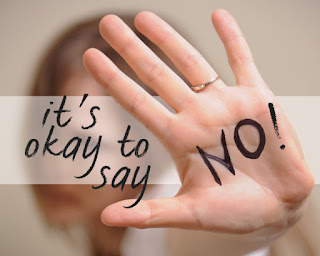Dave wasn’t quite ready to get married, but his girlfriend, Lizzie, had made it clear that the time had arrived. She brought it up almost daily. “We’ve been together for four years,” she said. “I know you
love me. We’re really happy together. So why you don’t want to marry me?”
Dave knew she was right. He loved Lizzie and wanted to be with her forever. But some part of him still wanted to say “no” to
marriage, at least for the moment. He just couldn’t explain it to her.
Janie had recently broken up with her boyfriend, and her friends were pressuring her to sign up to an
Internet dating site. But Janie was reluctant. “My biggest problem is not whether or not any guys will be interested in me,” she said a little shyly. “I’m sure someone out there will be. But what if I’m not interested in them? How do I politely reject someone? I just hate the idea of hurting someone’s feelings. And what if someone doesn’t take ‘no’ for an answer? It’s hard for me to be really firm.”
Larry’s buddies were going to an expensive club. Larry didn’t have that kind of money to blow on a night of drinking, and he also didn’t really want to get wasted, which he knew was going to be the end result of the evening. But he could not figure out how to get out of it without pissing off all of his friends.
Susie had landed a paying internship at the company of her
dreams. She knew that she was starting at the bottom, but she had hopes that her new employers would be impressed by her abilities and that she would quickly move up in the business. At her interview she had said that she would be willing to do anything they wanted, but really, she had no idea that they were going to expect her to keep the kitchen clean and pick up coffee and doughnuts for the morning meeting.
Do any of these situations sound familiar?
In a recent
Forbes Business article
Jonathan Becher(link is external) offers several quotes from powerful men who consider “no” to be an important part of a successful life strategy: Here are just three of his examples:
Steve Jobs: “Focusing is about saying ‘no.’”
Warren Buffett: “We need to learn the slow ‘yes’ and the quick ‘no.’”
Tony Blair: “The art of
leadership is saying no, not saying yes. It is very easy to say yes.”
But for many of us, it’s not so easy to develop this art.
Why is this?
Many of us are afraid of conflict. We don’t like others to be angry with us or critical of us. We therefore avoid saying “no” when we are afraid that it will put us into conflict with someone else, whether that someone is an intimate partner, a colleague or friend, or a supervisor or boss. Many of us also try to avoid battles with our children, because we feel that if we say “no” to them, they will stop loving us.
As children we are taught not to go against authority. We are supposed to do what
parents, teachers, and others in power tell us to do. We obey because of fears of being punished, but also because of a desire to please and be loved by these people who are very important to us. We carry this worry with us into adulthood.
But we are also pulled by a desire to fit in with and be liked by our peers. Research has shown that men and women have a tremendous need to belong to a peer group. Whether boy or girl, man or woman, we desire acceptance by our friends, or the people we want to be friends with, as a way of establishing and maintaining a sense of
identity, of “selfness.”
Don’t want to disappoint or hurt someone
So, you don’t want to tell your mom you won’t be home for the holidays because she’ll be so disappointed. Okay, makes sense, right? Sometimes we do things that make others feel better, even if it’s not quite what we want to do. But what if she’s going to be disappointed that you are making a job or a
career choice that she doesn’t like, but that is your total dream? Or what about something small, like disappointing a friend by not going out to dinner with her when you’ve got a huge work project due the next day? Or even smaller, what if you and your boyfriend or girlfriend can’t agree on a restaurant or a movie? Do you give in so that they won’t be disappointed?
Desire to be unique
Yet we are also encouraged to think “outside the box,” to focus on our unique talents and our personal truths. Most of us want to be viewed as special in some way, as different from the very group that we belong to. It is sometimes this need to be seen as a separate person that drives those of us who defy authority, often to our own detriment. “You’re not the boss of me,” shouted at some time or another by many young children, is a driving life force for all of us. But of course defiance and purposefully unacceptable behavior can backfire. It can make you stand out, but it can also separate you from the very group that you want to belong to.
Here’s a funny thing about the quality of specialness and difference. It seems that for many of us, feeling different feels best within the context of an accepting, affirming peer group!
Harder for women?
My PT colleague Kathryn Lively writes that women often have difficulty saying “no” to men, because we want to get along, want to be nice and don’t want to hurt another person’s feelings. In my work as a therapist over the years, I have certainly seen plenty of examples of this phenomenon; but I have also worked with many men who don’t say “no” because they don’t want to “rock the boat.”
What can you do about it?
Techniques
There are many techniques for getting better at saying “no,” once you’ve located some of the psychological reasons that make it difficult.
- Marcia Linehan, creator of Dialectical Behavioral Therapy (DBT), suggests practicing saying “no” in small, unimportant situations, like not buying something at a drugstore.
- Eating disorder specialist and my PT colleague Susan Albers suggests that you stop and breathe before saying “yes,” in order to give yourself a little space and an opportunity to assess and respond to your own needs.
- Seek advice. We’ll talk more about this in a moment, but in essence the point is to get backup for your own position.
- Don’t be fooled by the word “everyone else…” It is almost universally untrue that everyone else is doing the same thing or wants you to do whatever is being asked of you.
- Take a minute to ask yourself how bad the guilt, anxiety, disappointment or other emotions you might feel if you don’t do whatever’s being asked of you will be. Can you tolerate them? Is it worth it to do that thing in order not to feel those feelings?
- Assess the fallout. How bad will it be? Again, is it worth it to give in? Or not to?Consider that there is no perfect answer. If you say “yes” this time, you can try “no” sometime later. And maybe, just maybe, “yes” this time will make it easier to say “no” the next time.
- Remember that you can change your mind in most cases. Don’t get trapped by the belief that you only have one opportunity. There will be many more (see above).
- And finally, remember that sometimes “yes” is actually a better answer. We’ll talk more about this in a minute.
Getting backup
So how does this fit with saying “no”? It seems that most of us feel much better about saying “no” to someone if we have the backup of some buddies or folks that we trust.
Dave, for example, talked to his brothers and sister about his quandary with Lizzie. They helped him to put into words what he was feeling, and also to think about what was going on for Lizzie. After several conversations, he was able to explain to Lizzie that he loved her very much but wanted to ask her to marry him on his own time. Every time she brought it up, he felt like she was telling him what to do – “like my Mom, not my future wife.” They agreed that this theme of Lizzie acting like his Mom and Dave acting like a kid was something they needed to work on in their relationship in general. But now that they had a way of talking and thinking about why he was dragging his heels, Lizzie actually didn’t feel the need to keep pressuring him anymore!
Janie’s friends offered her a variety of techniques for saying “no” to guys, from “ghosting” or simply not answering their calls, which she said she could never do, to saying nicely but firmly that she simply didn’t think it was going to work. “It’s just part of the process,” she realized. “It’s not me being a mean or bad person.”
Larry also talked to a couple of friends who were not part of the drinking group. They told him that they just saw it as a waste of their time. “You spend a ton of money on something that leaves you feeling miserable and that affects your performance the next day,” they told him. “And the truth is, those guys won’t even notice if you don’t go. They’re just pushing you because they want the company.” To Larry’s amazement, they were right. He simply said that he couldn’t do it the next time, and after a couple of tries to change his mind, the other guys left him alone. And there was no change in the way they treated him at work. “I don’t even know that they realized I wasn’t there in the end,” he said.
Sometimes, “no” is the wrong word
Susie’s situation was a little different. In her case, after talking to several friends who supported her indignation – “you weren’t hired as a gofer or a maid!” said one, and “they wouldn’t do that to a guy,” said another – Susie talked to an older mentor, who said that in fact they would and had done exactly the same with male interns, that she was at the very bottom of the ladder, and that if she hung in there and made herself as useful as possible, not just in menial tasks but also doing research for projects and even, when appropriate, offering thoughts or ideas about current and future projects, she would soon find herself moving up the ladder. Her mentor said that she was not encouraging her to make herself into a doormat or that she accept inappropriate demands, but that in this particular case saying “no” would be counterproductive. And she then pointed to two senior members of the staff and said that they had each been interns at one time – and had each cleaned the fridge and brought coffee to the other staff.








